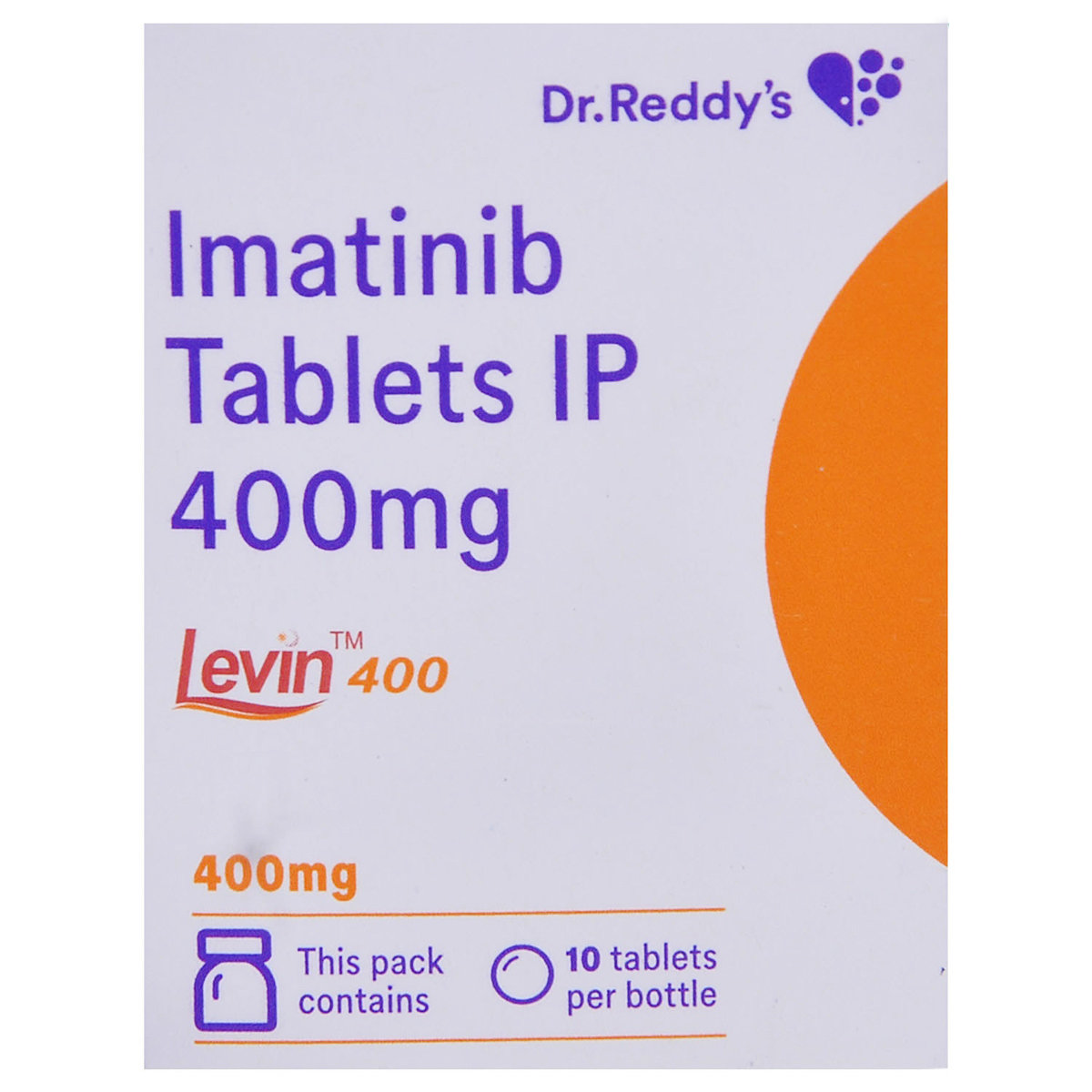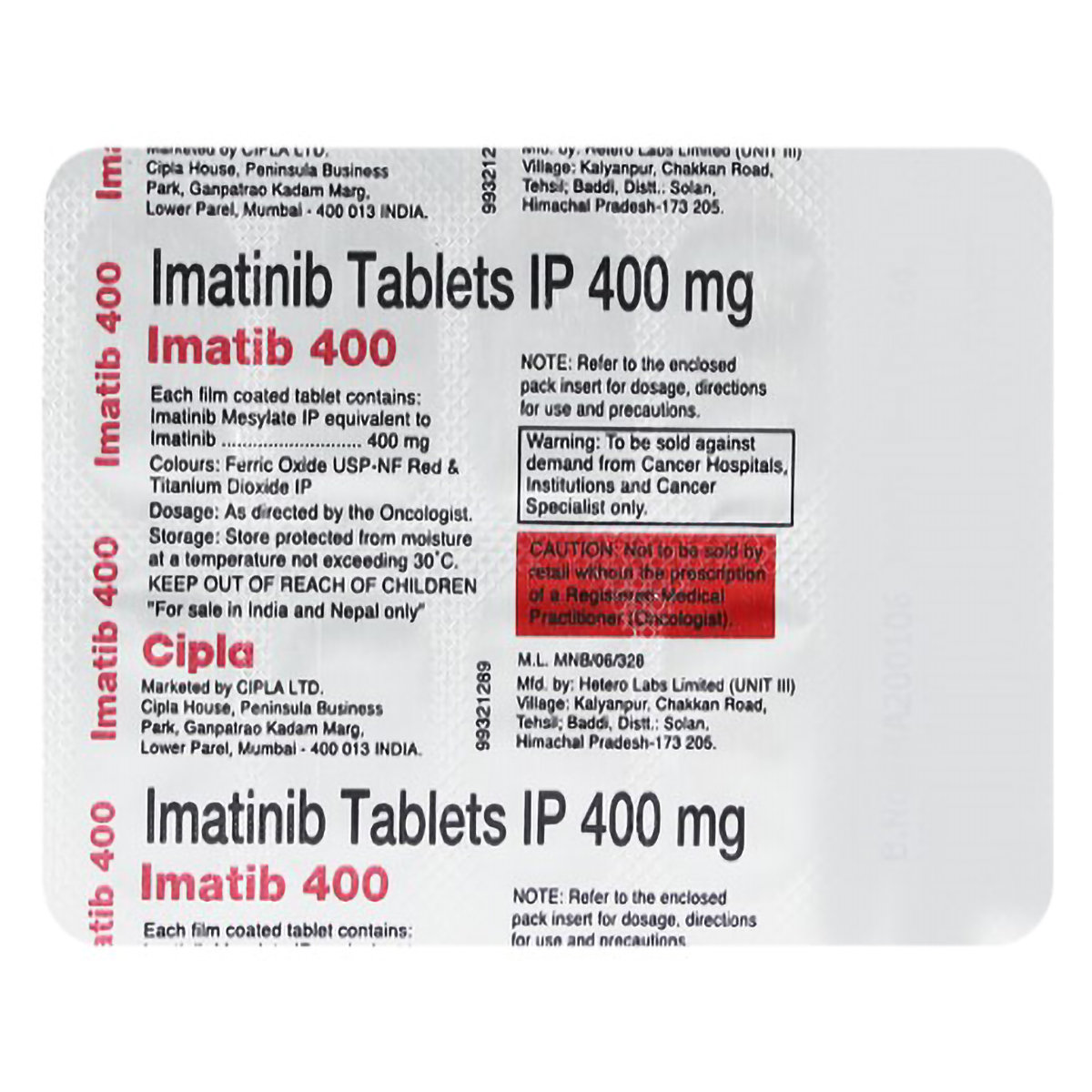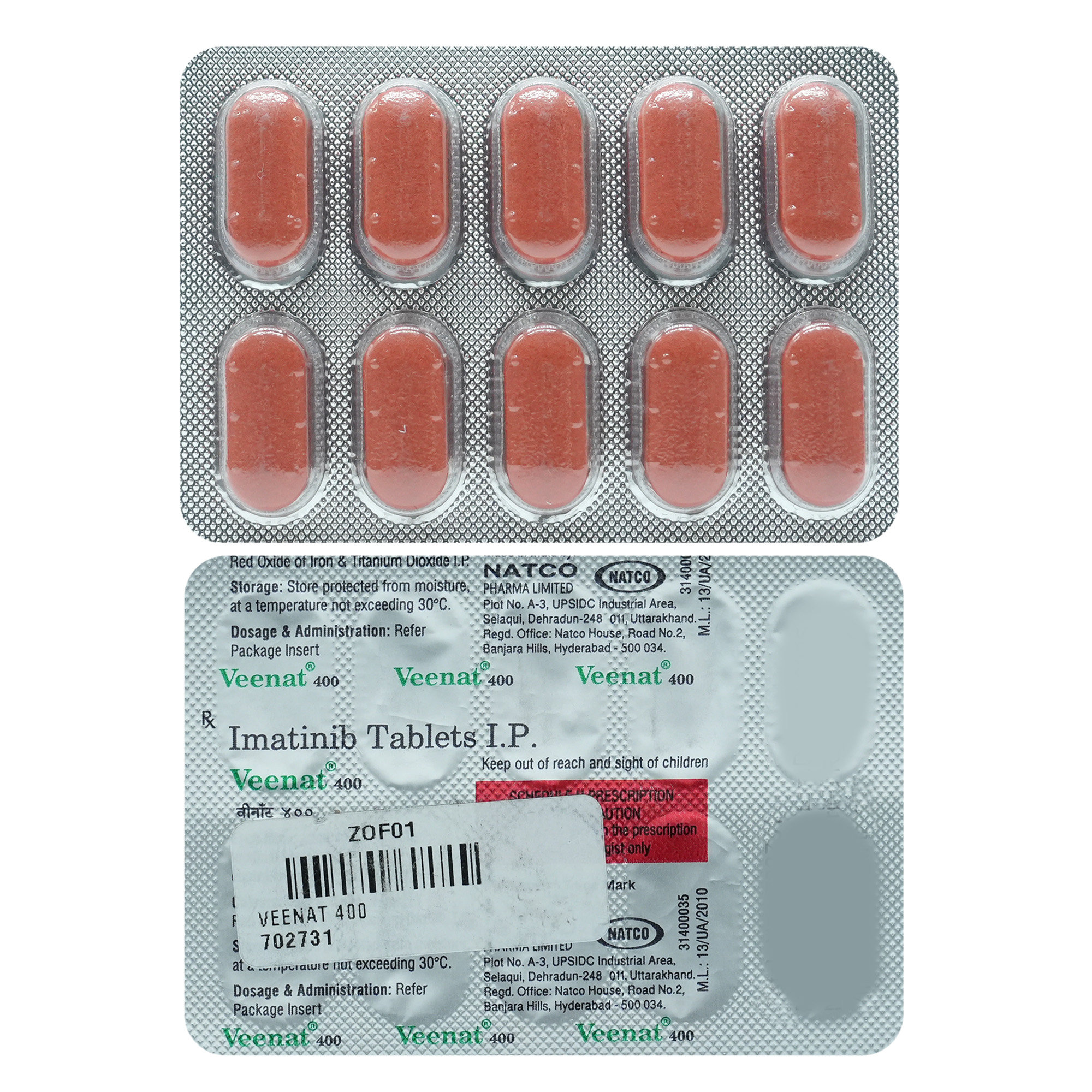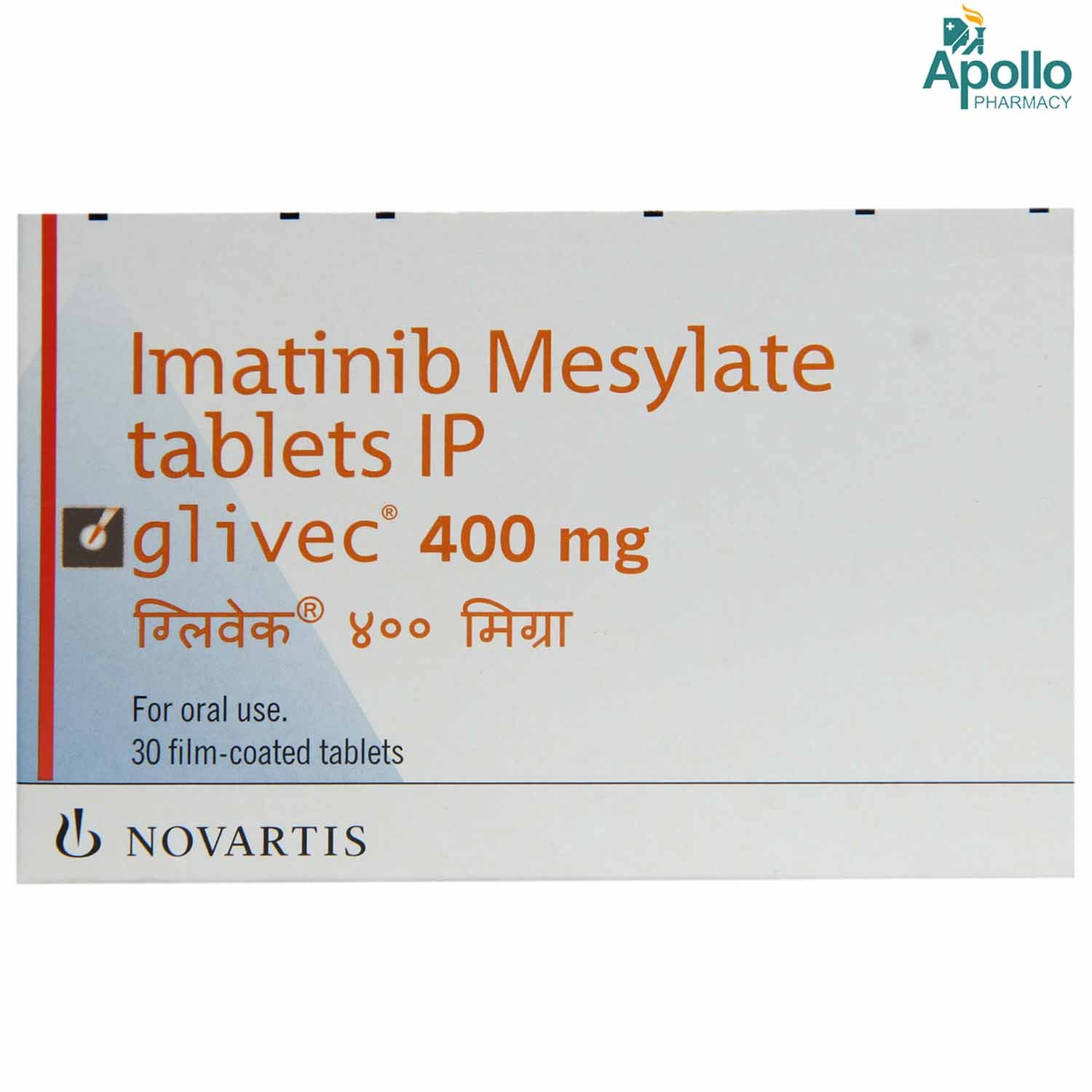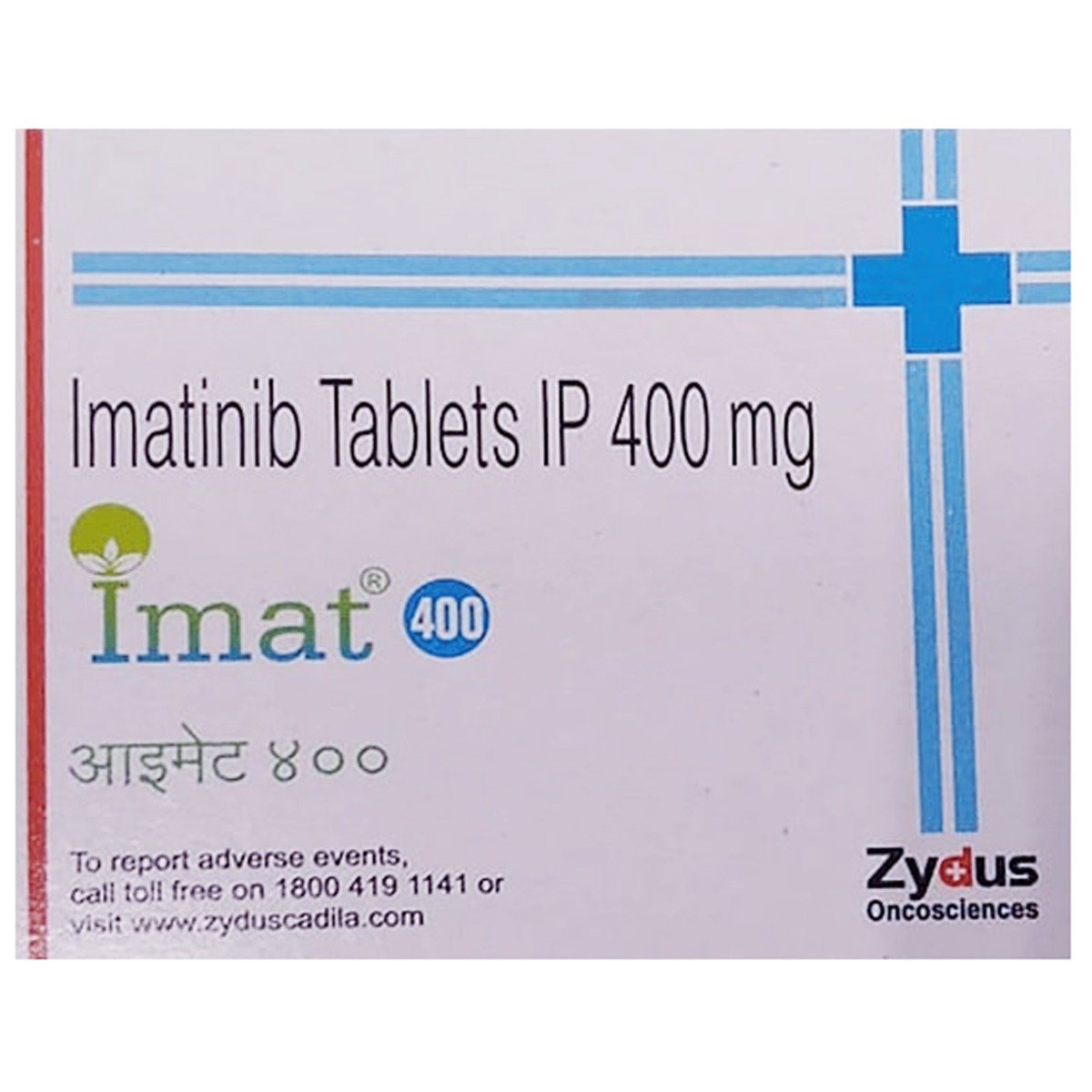Mitinab-400 Tablet 10's
MRP ₹20960
(Inclusive of all Taxes)
₹3144.0 Cashback (15%)
Provide Delivery Location
Online payment accepted
 Prescription drug
Prescription drugWhats That
Composition :
Manufacturer/Marketer :
Consume Type :
Return Policy :
About Mitinab-400 Tablet 10's
Mitinab-400 Tablet 10's belongs to a class of drugs known as 'anti-cancer medication', primarily used to treat various types of cancer. It is used to treat cancer of the blood (chronic myeloid leukaemia and acute lymphocytic leukaemia) and gastrointestinal stromal tumour. Cancer is a genetic change in which the cells divide uncontrollably and spread into surrounding tissues. There are more than 100 types of cancer, including blood cancer, lung cancer, breast cancer, etc.
Mitinab-400 Tablet 10's contains Imatinib, which is primarily used to treat cancer. It works by inhibiting an enzyme responsible for cancer cell proliferation and induces cell death (apoptosis). As a result, the growth and spread of cancer cells are stopped or slowed down.
You are advised to take Mitinab-400 Tablet 10's for as long as your doctor has prescribed it for you, depending upon your medical condition. In some cases, you may experience nausea, vomiting, oedema, fatigue, muscle cramps, musculoskeletal pain, diarrhoea, rash, and abdominal pain. Most of these side effects do not require medical attention and will resolve gradually over time. However, you are advised to talk to your doctor if you experience these side effects persistently.
Do not take Mitinab-400 Tablet 10's if you are allergic to any of its ingredients. While taking Mitinab-400 Tablet 10's, you might become more sensitive to sunlight, so it is important to protect your skin with a high sun protection factor (SPF). Regular blood tests are required to monitor liver function and blood cells in the blood while taking Mitinab-400 Tablet 10's. Mitinab-400 Tablet 10's can cause swelling and water retention, so if you have unexpected rapid weight gain, please consult your doctor. If you ever had a hepatitis B infection, please tell your doctor before starting Mitinab-400 Tablet 10's as it can make hepatitis B active again.
Uses of Mitinab-400 Tablet 10's
Directions for Use
Key Benefits
Mitinab-400 Tablet 10's belongs to a class of drugs known as 'anti-cancer medication' containing Imatinib, primarily used to treat various cancer types. It is used to treat cancer of the blood (chronic myeloid leukaemia and acute lymphocytic leukaemia) and gastrointestinal stromal tumour. It works by inhibiting an enzyme responsible for cancer cell proliferation and induces cell death (apoptosis). As a result, the growth and spread of cancer cells are stopped or slowed down.
Storage
- Inform your doctor about the nausea and discuss possible alternatives to the medication or adjustments to the dosage.
- Divide your daily food intake into smaller, more frequent meals to reduce nausea.
- Opt for bland, easily digestible foods like crackers, toast, plain rice, bananas, and applesauce.
- Avoid certain foods that can trigger nausea, such as fatty, greasy, spicy, and smelly foods.
- Drink plenty of fluids, such as water, clear broth, or electrolyte-rich beverages like coconut water or sports drinks.
- Use ginger (tea, ale, or candies) to help relieve nausea.
- Get adequate rest and also avoid strenuous activities that can worsen nausea.
- Talk to your doctor about taking anti-nausea medication if your nausea is severe.
- Record when your nausea occurs, what triggers it, and what provides relief to help you identify patterns and manage your symptoms more effectively.
- Rest well; get enough sleep. This helps the body fight infection.
- Keep yourself hydrated by drinking enough water and other fluids.
- Wash your hands often and avoid touching your eyes, mouth or nose.
- Wear a mask whilst going out.
- Warm steam or a hot shower may help with nose secretions.
- Avoid contact with others to prevent contamination.
- Muscle cramps can be treated with regular exercise or yoga, which includes mild stretching, which helps strengthen the lower body.
- Warm baths and gentle massage of the affected parts can help relieve cramps.
- Avoid strenuous activity and take frequent breaks, as rest is critical.
- Intake of nutritious food can help strengthen body and mind. A trained nutritionist can help design a balanced diet for strengthening muscles.
- Speak to your doctor if the pain lasts an extended period. Medical help can be practical in finding a cure for cramps.
- Hydrate your body: Drink enough water to prevent dehydration and headaches.
- Calm Your Mind: Deep breathing and meditation can help you relax and relieve stress.
- Rest and Recharge: Sleep for 7-8 hours to reduce headache triggers.
- Take rest: lie down in a quiet, dark environment.
- Cold or warm compresses can help reduce tension.
- Stay Upright: Maintain good posture to keep symptoms from getting worse.
- To treat headaches naturally, try acupuncture or massage therapy.
- Over-the-counter pain relievers include acetaminophen and ibuprofen.
- Prescription Assistance: Speak with your doctor about more substantial drug alternatives.
- Severe Headaches: Seek emergency medical assistance for sudden, severe headaches.
- Frequent Headaches: If you get reoccurring headaches, consult your doctor.
- Headaches with Symptoms: Seek medical attention if your headaches include fever, disorientation, or weakness.
- Consult your doctor if you experience skin redness, itching, or irritation after taking medication.
- Your doctor may adjust your treatment plan by changing your medication or providing guidance on managing your erythema symptoms.
- Your doctor may recommend or prescribe certain medications to help alleviate symptoms.
- Apply cool compresses or calamine lotion to the affected skin area to reduce redness and itching.
- Stay hydrated by drinking plenty of water to help alleviate symptoms and keep your skin hydrated.
- Monitor your skin condition closely and promptly report any changes, worsening symptoms, or concerns to your healthcare provider.
Drug Warnings
Do not take Mitinab-400 Tablet 10's if you are allergic to any of its ingredients. Mitinab-400 Tablet 10's may cause blurry vision and dizziness, so do not drive or operate any machinery which requires concentration. While taking Mitinab-400 Tablet 10's, you might become more sensitive to sunlight, so it is important to protect your skin with a high sun protection factor (SPF) while going out, as it can lead to a skin rash if you are not using a strong SPF. Mitinab-400 Tablet 10's can cause leg swelling and water retention (oedema), so if you have unexpected rapid weight gain, please consult your doctor. If you ever had a hepatitis B infection, please tell your doctor before starting Mitinab-400 Tablet 10's as it can make hepatitis B active again. Mitinab-400 Tablet 10's may make you more susceptible to infections; consult your doctor if you develop any signs of infections, fever, sore throat, breathlessness, jaundice, unexplained bleeding or bruising.
Drug-Drug Interactions
Drug-Drug Interactions
Login/Sign Up
When Mitinab-400 Tablet is taken with Conivaptan, it can cause increase in the blood levels of conivaptan leading to side effects.
How to manage the interaction:
Taking Mitinab-400 Tablet with Conivaptan is not recommended, it can be taken if recommended by your doctor. However, if you experience any unusual symptoms, consult the doctor.
When Lomitapide is taken with Mitinab-400 Tablet, it can increases levels of lomitapide which may lead to side effects.
How to manage the interaction:
Taking Mitinab-400 Tablet with Lomitapide is not recommended, but it can be taken if prescribed by your doctor. However, if you experience any unusual symptoms, consult the doctor.
Taking Mitinab-400 Tablet with Naloxegol may increase the level of naloxegol which may lead to side effects.
How to manage the interaction:
Taking Mitinab-400 Tablet with Naloxegol is not recommended, it can be taken if prescribed by your doctor. However, if you experience any unusual symptoms, consult the consult.
When Venetoclax is taken with Mitinab-400 Tablet, Mitinab-400 Tablet may increase the level of venetoclax which may lead to side effects.
How to manage the interaction:
Taking Mitinab-400 Tablet with Venetoclax is not recommended, it can be taken if prescribed by your doctor. However, if you experience any unusual symptoms, consult the doctor.
When Mitinab-400 Tablet is taken with Cisapride, it can increase the chance of a serious abnormal heart rhythm.
How to manage the interaction:
Taking Mitinab-400 Tablet with Cisapride is not recommended, it can be taken if a doctor has prescribed this. However, if you experience sudden dizziness, lightheadedness, fainting, breathing difficulty, or rapid heartbeat, consult the doctor immediately. Do not discontinue the medication without consulting a doctor.
When Dihydroergotamine is taken with Mitinab-400 Tablet, it increases levels of dihydroergotamine leading to side effects.
How to manage the interaction:
Taking Mitinab-400 Tablet with Dihydroergotamine is not recommended, it can be taken if advised by your doctor. However, if you experience any unusual symptoms, consult the doctor.
When Cobimetinib is taken with Mitinab-400 Tablet, it can increase the risk of serious side effects.
How to manage the interaction:
Taking Mitinab-400 Tablet with Cobimetinib is not recommended, but can be taken if prescribed by the doctor. However, if you experience any unusual symptoms, consult the doctor.
When Regorafenib is taken with Mitinab-400 Tablet, it may increase the level of Mitinab-400 Tablet which may lead to side effects.
How to manage the interaction:
Taking Regorafenib with Mitinab-400 Tablet is not recommended, it can be taken if prescribed by your doctor. However, if you experience any unusual symptoms, consult the doctor.
Taking Mitinab-400 Tablet with Flibanserin may increase the level of flibanserin in body leading to side effects.
How to manage the interaction:
Taking Mitinab-400 Tablet with Flibanserin is not recommended, but it can be taken if prescribed by your doctor. However, if you experience any unusual symptoms, consult the doctor.
Coadministration of Ivabradine with Mitinab-400 Tablet can increase the levels of Ivabradine in the body. This increases the risk or severity of side effects.
How to manage the interaction:
Taking Ivabradine with Bosutinib together is generally avoided as it can result in an interaction, it can be taken if your doctor has advised it. However, contact a doctor immediately if you experience sudden dizziness, lightheadedness, fainting, shortness of breath, chest pain or tightness, rapid heartbeat, or memory loss. Do not discontinue any medications without consulting a doctor.
Drug-Food Interactions
Drug-Food Interactions
Login/Sign Up
Grapefruit Juice, Grapefruit
How to manage the interaction:
Grapefruit or its juice may increase the blood levels of Mitinab-400 Tablet which may lead to side effects. Avoid consuming Grapefruit and its juice during treatment with Mitinab-400 Tablet.
Diet & Lifestyle Advise
- Maintain a healthy weight by performing regular low-strain exercises and eating healthy food.
- De-stress yourself by meditating, reading books, taking a warm bubble bath or listening to soothing music.
- Eat food rich in antioxidants such as berries, spinach, kidney beans, dark chocolate and high fibre content. Also, eat small and frequent meals for a speedy recovery.
- Avoid smoking and alcohol consumption. Also, avoid high fat and cholesterol diet.
Side Effects of Mitinab-400 Tablet 10's
- Fatigue
- Nausea
- Vomiting
- Diarrhoea
- Muscle cramp
- Abdominal pain
- Musculoskeletal pain
- Oedema (tissue swelling)
- Rash
Habit Forming
Therapeutic Class
All Substitutes & Brand Comparisons
RX
Out of StockAdmine 400 mg Tablet 10's
Adley Formulations
₹472.5
(₹47.25 per unit)
97% CHEAPERRX
Levin 400 Tablet 10's
Dr Reddy's Laboratories Ltd
₹928
(₹83.52 per unit)
96% CHEAPERRX
Imatib 400 Tablet 10's
Cipla Ltd
₹1787
(₹160.83 per unit)
92% CHEAPER
Drug-Diseases Interactions
Drug-Diseases Interactions
Login/Sign Up
FAQs
Drug-Drug Interactions Checker List
- WARFARIN
- ASPIRIN
- AMLODIPINE
- METOPROLOL
- NIFEDIPINE
- QUINIDINE
- ATORVASTATIN
- LOVASTATIN
- SIMVASTATIN
- CYCLOSPORINE
- ERYTHROMYCIN
- TELITHROMYCIN
- ITRACONAZOLE
- VORICONAZOLE
- KETOCONAZOLE
- TRIAZOLAM
- ALPRAZOLAM
- ESTAZOLAM
- PRIMIDONE
- PHENOBARBITAL
- PHENYTOIN
- SAQUINAVIR
- RITONAVIR
- SILDENAFIL
Special Advise
- A regular blood test is required to monitor liver function and blood cells in blood while taking Mitinab-400 Tablet 10's.
- Always take it with food and a full glass of water to prevent nausea.
- Mitinab-400 Tablet 10's can cause swelling and water retention, so if you have unexpected rapid weight gain, please consult your doctor.
- While taking Mitinab-400 Tablet 10's, you might become more sensitive to sunlight, so it is important to protect your skin with a high sun protection factor (SPF) while going out, as it can lead to a skin rash if you are not using a strong SPF.
- Do not have immunisations with live vaccines (for mumps, rubella, measles and BCG, yellow fever and shingles or pox chicken) while you’re having treatment and for up to 12 months afterwards.
- Contact your doctor immediately if you experience any infection signs, including a temperature above 37.5 C or below 36 C.
Disease/Condition Glossary
Cancer: It is a genetic change in which our cells divide uncontrollably and spread into surrounding tissues. There are two types of cancer: benign (localized) and metastatic (spread to the whole body). There are more than 100 types of cancer, including blood cancer, lung cancer, breast cancer, etc. Cancer growth can be prevented by chemotherapy (by strong antibiotics), radiation and stem cell therapy. To date, there is no cure for cancer.
Chronic myeloid leukaemia: It is a type of cancer that affects the white blood cells and tends to progress slowly over many years. It can occur at any age but is most common in adults around 60-65.
Acute lymphocytic leukaemia: A type of leukaemia (blood cancer) that comes on quickly and is fast-growing. In acute lymphoblastic leukaemia, there are too many lymphoblasts (immature white blood cells) in the blood and bone marrow.
A gastrointestinal stromal tumour (GIST): It is a type of tumour in the stomach or small intestine. The tumours develop into the specialized cells called interstitial cells of Cajal (ICCs).

Have a query?
Alcohol
Safe if prescribed
Avoid alcohol consumption while taking Mitinab-400 Tablet 10's as it may increase drowsiness and lead to unpleasant side effects.
Pregnancy
Consult your doctor
Mitinab-400 Tablet 10's is a pregnancy category D drug. It should not be used in pregnancy as it is known to cause fetal damage. Also, maintain a gap of 6 months between the last dose of Mitinab-400 Tablet 10's and your next pregnancy.
Breast Feeding
Consult your doctor
Mitinab-400 Tablet 10's is known to pass through breast milk, and it may cause harm to the baby. So, it is advised not to breastfeed while taking Mitinab-400 Tablet 10's.
Driving
Safe if prescribed
Mitinab-400 Tablet 10's may cause weakness, dizziness and drowsiness. Do not drive or operate machinery unless you are alert.
Liver
Consult your doctor
Dose adjustment may be needed in patients with liver impairment. Please consult your doctor if you have a liver impairment or any concerns regarding this.
Kidney
Consult your doctor
Dose adjustment may be needed in patients with kidney impairment. Please consult your doctor if you have kidney impairment or any concerns regarding this.
Children
Safe if prescribed
The safety and efficacy of Mitinab-400 Tablet 10's are not known in children. It should be taken only if prescribed by a doctor.




